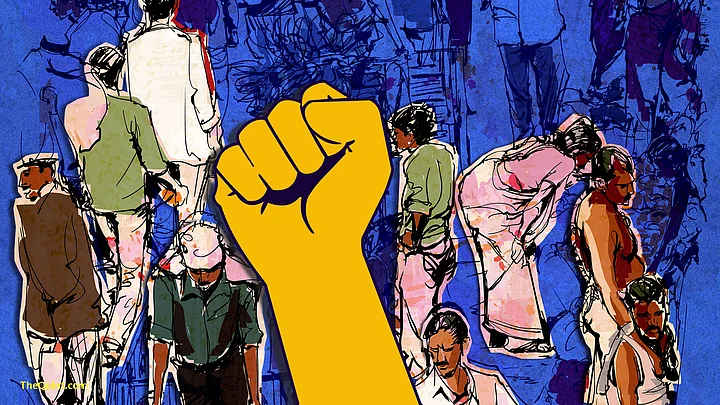In August 2016, Arun Naikuji, a 48-year-old man killed himself in Pune in Maharashtra after a ‘jaat’ panchayat socially ostracised him and his family. Naikuji and his family were boycotted after his brother helped his friend marry a girl from another caste. In Andhra Pradesh, since 5 May 2017, around twelve hundred Dalits in Garagaparru village in West Godavari have been boycotted by landlords in their village.
In India, social boycott is an extrajudicial form of punishment, used to perpetuate caste and religion-based discrimination. But that’s about to change; in one state.
On 13 July 2017, President Pranab Mukherjee gave his assent to the Maharashtra Prohibition of People from Social Boycott (Prevention, Prohibition and Redressal) Act, 2016. The Act is the first law in India to punish social boycott, and will regulate organisations like the ‘jat’ (caste) panchayat. Seen as a progressive step in dealing with caste-based discrimination in Maharashtra, here’s all you need to know about the Act.
Wait, What is the Prohibition of People from Social Boycott Act?
Under the Act, social boycott is a punishable offence which includes a fine of up to Rs 5 lakh and imprisonment of up to seven years or both.
Families, communities and individuals can now be punished under this law, if they are found to be guilty. Reasons for social boycott include religious rituals, inter-caste marriage, lifestyle, dress or vocation, and a victim can file a complaint either with the police or directly to the magistrate.
The Act also makes provisions for six-month long speedy trials. Interestingly, the Act provides for a state government-appointed Social Boycott Prohibition officers to ‘assist the police and magistrate’ and track cases of social boycott.
Why Do We Need a Law Against Social Boycott?
For Avinash Patil, state executive president of Maharashtra Andhashraddha Nirmoolan Samiti (MANS), the Prohibition Against Social Boycott law is a long-cherished dream.
The MANS, a social organisation founded by Narendra Dabholkar, had prepared a draft law and submitted it to the state government in Maharashtra in 2015. The Bill was forwarded to the central government in March 2016, and after getting clearance from central government ministries was finally approved by the President on Thursday.
Speaking to The Quint, Patil asserted that exploitation is prevalent in Maharashtra with caste panchayats punishing Dalits for acts like drawing water from a well. He says:
This is the first law in India against caste panchayats and the discrimination which they perpetuate. It’s the first step towards a caste-less society in India.
But how will the law be implemented, especially since there are existing provisions in the IPC which might cover consequences of social boycott? According to Patil, execution of the Act is premised on the administration and the police being made sensitive to social boycott.
Can A Similar Act Work In States Like Uttar Pradesh?
Caste panchayats are rampant in states like Uttar Pradesh, with frequent incidents of social boycott against Dalits, inter-caste couples, families of rape survivors, etc. Does a similar law against social boycott have potential to work in Uttar Pradesh?
Sudha Pai, professor at the Centre for Political Studies in Jawaharlal Nehru University (JNU) and well-known author on Dalit politics, doesn’t think so. Speaking to The Quint, she says,
Social boycott is less widespread in Maharashtra than in Uttar Pradesh. The law might have some deterrent impact in the state, but it might be difficult to assess at this stage.Sudha Pai, Professor, Centre for Political Studies, JNU
Since caste-based discrimination in a village is insular in nature, it is possible that the new law might increase conflict as well. Pai says,
A law against social boycott might increase conflict between the victim who has filed a complaint and the rest of the community. In cases of a social boycott, it is seen that villagers impose a fine on those who don’t abide by the social boycott. It is a contentious law, and a new kind of law, so we will have to wait and watch.
How Will This Law Impact Politics in Maharashtra?
Can this law be a strategy by the Devendra Fadnavis-led BJP government to appeal to the Dalit voter in the state? Well, not really.
According to Rajeshwari Deshpande, professor of politics at the University of Pune, “there isn’t much opposition to the BJP among Dalits and other communities, so this Bill will not make much difference.”
Commenting on Dalit politics in Maharashtra, she told The Quint:
Dalit politics in Maharashtra has momentum but it’s not strong in terms of electoral politics. I don’t think the Bill will contribute to the momentum of Dalit politics in the state. The suffering of Dalits in the state and their political affiliations are in two different directions.Rajeshwari Deshpande, Professsor, University of Pune
The Maharashtra Prohibition of People from Social Boycott (Prevention, Prohibition and Redressal) Act, 2016 is an unusual law in India.
It’s the first law to deal with social boycott; a complex concept where discrimination based on caste, religion and gender intertwines with community. Can a law deal with an issue of mindset?
(At The Quint, we question everything. Play an active role in shaping our journalism by becoming a member today.)
